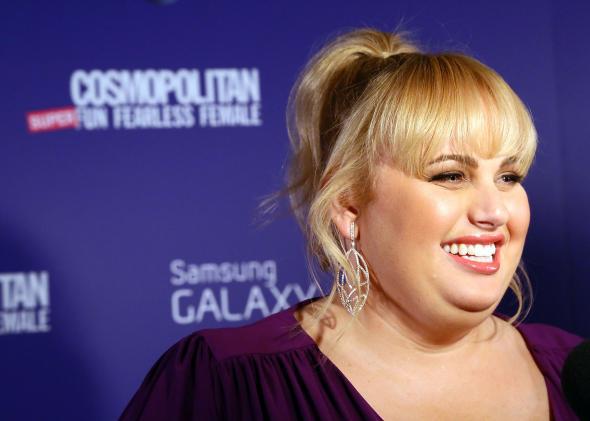In the New Republic, Laura Bennett poses a smart question: Why are culture critics so squeamish about Rebel Wilson’s weight? With the exception of Slate’s own Willa Paskin, who addresses Wilson’s fat-based humor head on in her review of the new sitcom Super Fun Night, critics have dodged the issue of Wilson using her ample body as a consistent punch line. Despite the question, Bennett doesn’t really wrestle with why critics are so squeamish with weight talk, beyond their general desire to be politically correct. But the reluctance to frankly talk about Wilson’s body mirrors popular culture’s increasingly dysfunctional relationship to weight in general.
It’s fair to say that in the past few decades, the average already slender woman on television has become even smaller. Don’t believe me? Check out photos of the OG cast of 90210 and the newbies. Now, there are so few women over a size 2 that the non-P.C., amateur critical culture—which is to say, commenters, Tweeters, Facebookers—loses its mind whenever a nonskinny woman is on television. This mind-losing is usually negative and awful. But even when the reaction is fawning, like with Christina Hendricks’ curves, it’s overwhelming and takes the focus away from the talent, or lack thereof.
Seeing not-super-slender bodies on television is so surprising these days that the TV shows that feature non-stickwomen (and men, to a lesser degree), have made the bodies a focal point of the shows. This is the case with Mike and Molly, Drop Dead Diva, Girls, and now Super Fun Night. As the hoi polloi on the Internet gets crueler and crueler when it comes to weight (see this Salon piece by an overweight woman about her Facebook picture going viral), polite society goes the other way and tries not to talk about it at all. This isn’t helpful, and as I pointed out last week, it’s bad for descriptive writing, not to mention comedy criticism.
I don’t think the solution here is never to talk about fat in comedy again or to never make fatness the butt of a joke. Comedy is always going to be about pushing boundaries of politeness. Like with rape jokes, joking about bodies is all about intention and execution. I do think the solution is to have more diversity in body size and not to make size the raison d’etre of the show in the first place.
Fatness as a television premise is pretty thin (sorry) to begin with. I know Roseanne Barr is off her nut now, but her show is the gold standard of body diversity and humor. Roseanne and Dan Connor’s weight was certainly part of their identities and humor, but it wasn’t the whole of their identities or the center of the show. The only comedies I can think of with diverse female bodies where those bodies aren’t the main focus are Orange Is the New Black and Eastbound and Down, at least where April is concerned. Here’s to more of that.
